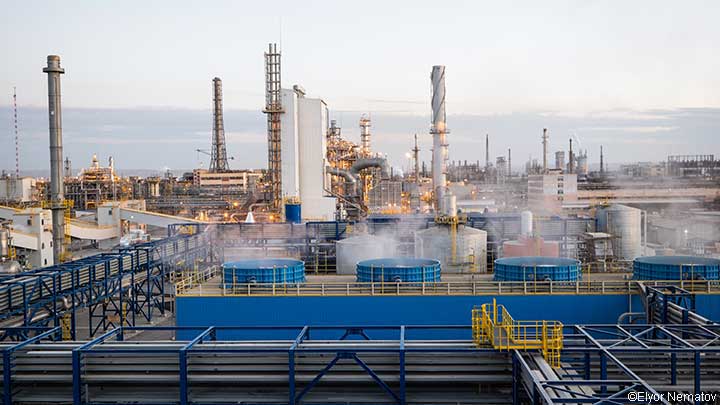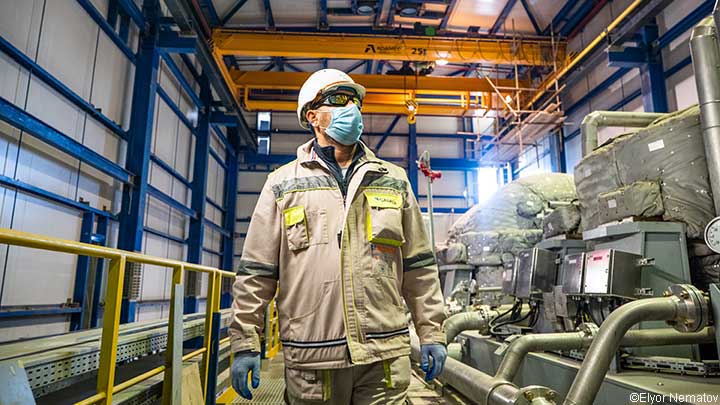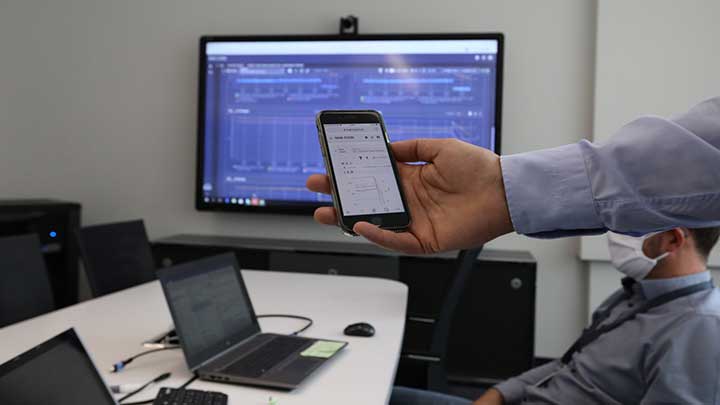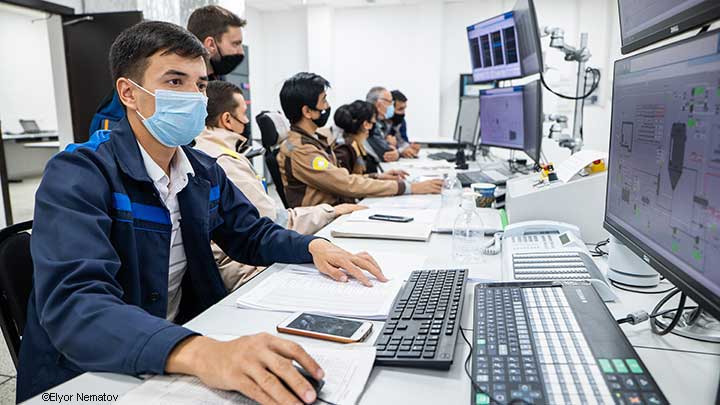Engineers open up a new digital frontier by remotely
commissioning turbomachinery from 6,000 kilometers away.
When the pandemic forced MAN Energy Solutions engineers to leave their work undone at the construction of a new nitric acid plant in Uzbekistan, they embarked on a historical step in mechanical engineering: the first fully-remote supervised commissioning of a compressor train using digital technology.
By Ingo Petz

When construction of the Navoiyazot plant stopped due to a Covid-19 national lockdown, the project threatened to become an economic disaster.
On location in Navoiy in southwestern Uzbekistan, Dirk Wohlfarth and team had completed the cold commissioning of a four-part compressor train (an air and nitrous oxide compressor, a gas expander, and a steam turbine) that would make up the heart of a
new nitric acid plant being built for the country’s largest chemical company, JSC Navoiyazot. Then on March 11 the World Health Organization declared Covid-19 a global pandemic, and on March 23 Uzbekistan, like so many other countries around
the world, went into a national lockdown.
Wohlfarth and others working on the project had to leave as soon as possible. The plant, meant to increase JSC Navoiyazot’s production volumes by some 500,000 tons of nitric acid per year for the production of fertilizer, would remain inoperable. An economic catastrophe was looming on the horizon.
Luca Frediani, Senior Machinery Engineer at Casale SA, the company responsible for designing and building the new plant, perhaps put it best: “There was no blueprint for such an unprecedented situation like this – every party involved in this project was challenged to try new ways of working.” For Wohlfarth and his colleagues this meant the unprecedented decision to commission the compressor train remotely.
There was no blueprint for such an unprecedented situation like this – every party involved in this project was challenged to try new ways of working.
Digitally-enabled turbomachinery
“At first I thought it was a joke,” says Wohlfarth. “Commission a compressor train this size over the Internet? That’ll never work!” Wohlfarth is Senior Commissioning Engineer at MAN PrimeServ in Oberhausen, Germany, a down-to-earth
Munsterlander. As a control specialist, he has over 20 years of experience with turbomachinery. But he and his colleagues had never been in a situation like this before.
Wohlfarth returned to his home office in the town of Bocholt on the Germany-Netherlands border and soon had data from the plant in Uzbekistan wavering across his computer screen and analyses and diagnostic charts flickering before his eyes. What he initially thought was a joke had become a reality. The turbomachinery installed was already digitally-enabled with hardware components that allow remote access to the machine control-system and collect and evaluate data. So using a secure internet line, the hundreds of sensors attached to the compressor train in Navoiy, almost 6,000 kilometers away, were able to send near real-time data to his home office via MAN Energy solutions’ digital platform MAN CEON. At the same time, he was in contact with his coworker Nikolay Marinov, the project’s mechanical commissioning engineer, who monitored the mechanical start-up of the compressor train from his own home office in Bulgaria.

Navigating Covid-19 disruption: MAN Energy Solution engineers worked with local specialist to commission the four-part compressor train, shown here to the right.
Remote-support tools and augmented reality

Going the distance: Thanks to digitally enabled machinery, Dirk Wohlfarth, MAN PrimeServ’s Senior Commissioning Engineer, was able to receive near real-time data from the compressor train some 6,000 kilometers away.
The remote commissioning was made possible by the MAN CEON application, which monitors the compressor train’s operation around the clock, and the PrimeServ EyeTech support tool, an augmented reality app originally introduced by MAN Energy Solutions for remote servicing or to provide technical assistance during troubleshooting. PrimeServ EyeTech uses special camera glasses or, as in Uzbekistan, smart phones to allow technical staff like Wohlfarth to see what local specialists are seeing.
“I’m actually used to seeing and feeling the machine,” says Wohlfarth. “So this was completely new. We’re not building factory-line cars, but complex special machines, and problems can always occur – which is why we’re normally on site to intervene.” Instead, Wohlfarth and the rest of the team worked closely with the onsite specialists, going over all the steps, possible risks and escape routes for all phases of the commissioning, testing and ignition. On May 16, the green light was giving to start the complete compressor train, and the plant’s first operation coincided with a total examination by the MAN PrimeServ specialists.
Remote commissioning in Japan

Inspecting operations at the Navoiyazot plant: Since May 28, 2020, the compressor train at the plant has been running flawlessly thanks to a team of engineers and specialists from MAN Energy Solutions and Casale SA.
“Since May 28, the system has been purring like a kitten,” says Jörg Massopust, Head of Digital Sales & Alliances for MAN Energy Solutions, at their PrimeServ offices in Oberhausen. The halls and buildings here – the site of innovations in mechanical engineering for more than 200 years – are bathed in a pale autumn light, almost as if they wanted to conceal their own importance. “Here in the Ruhr (the valley where Oberhausen is located),” says Massopust, “we’re actually quite reticent when it comes to our achievements.” Then he leads the way into the Remote Operations Center with screens so huge it looks like the bridge of a spaceship.
This is where all the data, videos and communication of the historic remote commissioning operation – a world’s first – converged under the watchful eye of other specialists. Another remote commissioning project is currently being operated from here to commission a steam turbine in Japan. Massopust watches an incoming transmission video from Japan, in which an engineer explains the current situation. “This was all new territory for us,” he says afterward, “but in situations like that, you’re forced to go further. The fact that the commissioning worked was due to our precision machines, the highly qualified people in the team and, ultimately, the trust we placed in each other.”The future of digitalization in mechanical engineering
Refait Saeed, Executive Project Director at Casale, agrees with Massopust: “In my opinion, the main factor in this challenge was the deep respect we had for each other’s technical competencies, the mutual trust and the open and honest collaboration between Casale and MAN Energy Solutions. Because without this transparency, we wouldn’t have been able to solve problems encountered on site from thousands of kilometers away.” The success of the project, Saeed adds, “also shows that digitalization has entered all aspects of our lives and will have continued benefits for mechanical engineering as well.”
Back at the offices in Oberhausen, the importance of digitalization in mechanical engineering continues to be exploited, especially now that the Covid-19 pandemic has restricted travel. “Since our specialists are unable to travel to plants around the world,” says Massopust, “we’ve expanded and consolidated PrimeServ as a remote analytics support for virtual maintenance work for 43 customers in 29 countries.”
Will the successful project in Uzbekistan drive digitalization even further? “It certainly will,” says Massopust. “And all this has a significant environmentally friendly aspect, if we don't have to travel so much anymore. It remains to be seen whether remote commissioning can become the norm: that depends on complex factors that simply have to be thoroughly calculated.” Then Massopust looks out the window just as the sun appears for a brief moment. He starts again: "Digitalization opens up completely different possibilities for us at MAN.” He smiles confidently. In our time, belief in the future has gone a little out of fashion. But in this moment you can feel it again: not only the belief, but the desire to make it happen.
About the author
Based in Berlin, author and journalist Ingo Petz has worked for more than 12 years as a freelancer covering Eastern Europe for publications such as the Frankfurter Allgemeine Zeitung and Der Standard.
About MAN CEON and PrimeServ Assist
The new MAN CEON digital platform intelligently collects and evaluates operating and sensor data, enabling real-time monitoring of marine and power-plant engines, turbines and compressors. The MAN CEON application visualizes data and information from
MAN machinery and its operational environment and provides a wide range of analysis tools for validating existing issues.
PrimeServ Assists combines human expertise with digitalization by leveraging the data streams from MAN CEON. With the support of remote diagnostics and real-time analytics, experts in MAN’s Remote Operation Centers are able to maximize operations
and detect and remedy anomalies before they become issues.
Explore more topics
MAN Energy Solutions is now Everllence.
We have adopted a new brand name and moved to a new domain: www.everllence.com. This page will also be relocated there shortly. We are working on shifting all pages to www.everllence.com.
